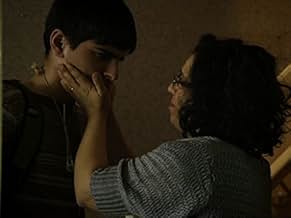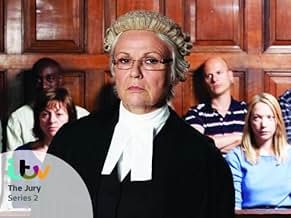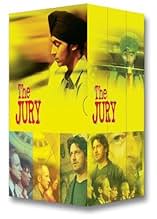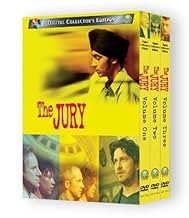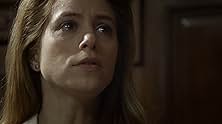Zwölf Männer und Frauen werden als Geschworene für die Wiederaufnahme des Prozesses gegen einen wegen dreifachen Mordes angeklagten Mann berufen, nachdem das Oberste Gericht das ursprünglich... Alles lesenZwölf Männer und Frauen werden als Geschworene für die Wiederaufnahme des Prozesses gegen einen wegen dreifachen Mordes angeklagten Mann berufen, nachdem das Oberste Gericht das ursprüngliche Urteil aufgehoben hat.Zwölf Männer und Frauen werden als Geschworene für die Wiederaufnahme des Prozesses gegen einen wegen dreifachen Mordes angeklagten Mann berufen, nachdem das Oberste Gericht das ursprüngliche Urteil aufgehoben hat.
Folgen durchsuchen
Empfohlene Bewertungen
I set out to watch this 6 hour British mini series for one reason: I'm a huge fan of Gerard Butler's. I came away amazed at how really good I thought it was. The mini-series deals with the trial of a Sikh student accused of brutally killing a fellow student (and compelling evidence both for and against). And while it does indeed explore the trial itself, the beauty of this series is the exploration of the jurors and their lives (something rarely done). It takes 7 of the 12 jurors and shows what is going on in their lives (and by proxy, what their lives the last several years must have been like). You have the alcoholic just out of rehab the first morning of the trial (Butler), the single mother with her own "mom" issues, the seminary student torn between his love of God and his love of a woman, the old Catholic woman who is clearly lonely, the man who had lost his fortune a while back and is no longer financially well-off, the woman who is controlled by her ex-military and semi-crippled husband and last the responsible citizen who is pleased and overwhelmed at the duty placed on him (and who has the most clueless in-laws). You have the not-so-nice prosecutor (played admirably by Antony Sher) and the decent defense barrister (played well as always by Derek Jacobi). Almost all the characters are to some degree stereotypes, but it is how the actors portray them and the way they are written--the way these stories unfold--that is so special. These performances are just truly wonderful (notably Butler and the actors portraying the abused wife, the single mom and the duty bound juror) The ultimate outcome of the trial, while important, takes second place to the jurors' outcome and the central question: how difficult is it to reach a decision on guilt or innocence when you can NEVER really know?
This was quite an ambitious undertaking; a six part exploration of not only the dynamics of the jury room but also the effects of the criminal trial on the lives of jurors, their families, the victim's family and the accused and his family.
The jury here is almost perversely diverse, with everyone from a young single black mother to a trainee priest. We follow seven of the jurors home during adjournments and realise that strains and stresses of the jury box and room aren't the half of it. One unlucky juror has a father-in law from hell who wants in on the case. Another is a recovering alcoholic who is finding it hard to stay on the straight and narrow, despite his invaluable `personal trainer' Juror Rose (Helen McCrory) is unlucky enough to be married to a control freak (she took on jury service to get away from him) and to then get friendly with the alcoholic. Juror Jeremy, a down and out businessman, is thrown by an accidental encounter with the man whose sure fire deal nearly ruined him. The trainee priest is having doubts about his vocation and the old lady he befriends finds out she is seriously ill.
The courtroom scenes on the other hand run pretty smoothly (though there is a surprise witness). We have top leading counsel of course, Anthony Sher for the prosecution and Derek Jacobi for the defence, but their performances are so glossy and professional as to be almost boring. The judge is almost invisible, despite a lot of noise from the gallery.
This brings me to two irritating aspects. This being a `racial' killing (Sikh boy accused of killing white schoolboy bully with ceremonial sword) there is a demonstration by both sides outside the Old Bailey every morning and afternoon. I can't believe the police would allow the jurors to be routinely intimidated in this way (though most of them did seem to have other things on their minds.) Surely there is a back door (or they could have bussed them out). Secondly, the practice here in Australia is to `sequester' the jury members ie cut them off from family and friends and anyone else who might try to nobble them after they retire to consider their verdict. We copied this practice from the English. Surely they still sequester the jury at the Old Bailey?
Technical grizzles aside this was a very watchable show with some nice acting. There are weaknesses in some of the plotlines and there's rather a ham-fisted attempt to leave things up in the air at the end, but the film reveals the value of the jury as an institution even if individual jurors might be pretty quirky. To some extent majority verdicts (which we don't have in NSW) iron out some of these, though the storyline here suggests such verdicts have problems of their own.
In the end the jurors do their job conscientiously to the best of their ability, despite all the distractions. Whether they are right or wrong is hardly the point; they represent humanity in the administration of justice, which would be mighty cold and austere without them.
The jury here is almost perversely diverse, with everyone from a young single black mother to a trainee priest. We follow seven of the jurors home during adjournments and realise that strains and stresses of the jury box and room aren't the half of it. One unlucky juror has a father-in law from hell who wants in on the case. Another is a recovering alcoholic who is finding it hard to stay on the straight and narrow, despite his invaluable `personal trainer' Juror Rose (Helen McCrory) is unlucky enough to be married to a control freak (she took on jury service to get away from him) and to then get friendly with the alcoholic. Juror Jeremy, a down and out businessman, is thrown by an accidental encounter with the man whose sure fire deal nearly ruined him. The trainee priest is having doubts about his vocation and the old lady he befriends finds out she is seriously ill.
The courtroom scenes on the other hand run pretty smoothly (though there is a surprise witness). We have top leading counsel of course, Anthony Sher for the prosecution and Derek Jacobi for the defence, but their performances are so glossy and professional as to be almost boring. The judge is almost invisible, despite a lot of noise from the gallery.
This brings me to two irritating aspects. This being a `racial' killing (Sikh boy accused of killing white schoolboy bully with ceremonial sword) there is a demonstration by both sides outside the Old Bailey every morning and afternoon. I can't believe the police would allow the jurors to be routinely intimidated in this way (though most of them did seem to have other things on their minds.) Surely there is a back door (or they could have bussed them out). Secondly, the practice here in Australia is to `sequester' the jury members ie cut them off from family and friends and anyone else who might try to nobble them after they retire to consider their verdict. We copied this practice from the English. Surely they still sequester the jury at the Old Bailey?
Technical grizzles aside this was a very watchable show with some nice acting. There are weaknesses in some of the plotlines and there's rather a ham-fisted attempt to leave things up in the air at the end, but the film reveals the value of the jury as an institution even if individual jurors might be pretty quirky. To some extent majority verdicts (which we don't have in NSW) iron out some of these, though the storyline here suggests such verdicts have problems of their own.
In the end the jurors do their job conscientiously to the best of their ability, despite all the distractions. Whether they are right or wrong is hardly the point; they represent humanity in the administration of justice, which would be mighty cold and austere without them.
10swanzer
A very compelling story about a young Seikh man who is charged with murdering a classmate. I enjoyed the relationships the characters formed with each other and how they were brought together for the conclusion of the story. I thoroughly enjoyed Gerry Butler's role as a young man fresh out of rehab struggling to make a new life for himself despite all his difficulties. The ensemble cast draws you into their own personal trials as well as their fight for the truth in the trial they sit for. The story keeps you guessing and even in the end, you still are not sure what is the actual truth. A great British version of the American-types of "Law and Order" and "The Practice" series.
Has anyone mentioned the music score for this? From the first shot of the courthouse dome, melancholy music perfectly sets the mood for what will come.
The Eastern (or Indian) theme and the drum at the beginning credits is haunting. During the seminary scenes, the mens choral is lovely.
Throughout a woman hums a beautiful, sad melody, through certain transition scenes and always at the opening of a new chapter. Whenever juror, Johnny Donne, is alone this theme emphasizes his loneliness and breaks your heart. A number of times we see Johnny arriving home and walking down a long corridor and opening his door, with this lonely theme playing. His AA prayer also has the music softly in the background.
During the Rose characters arrival back home each time, we see her getting off the elevator and walking into a blinding white light - to give us a jolt of the searing effort to walk back into that house of pain. The orchestra with an oboe(?) featured makes one want to cry.
During the foreman of the juries final scenes of frenzy in the tunnel the Indian song is just perfect - the wail and lament of a man driven to distraction.
And as the jurors all walk down the hill after the burial, the same woman humming the theme music makes for a melancholy finale.
For the performances, the great cinematography, and wonderful music themes, this a rare series from television that is as great as a movie. Gerald Butler as Johnny is a standout - so intense at times you quit breathing. I've forgotten the name of the actor who plays the Foreman of the jury, but he is also outstanding. The whole cast is superb.
A real jewel for anyones collection. 9/10
The Eastern (or Indian) theme and the drum at the beginning credits is haunting. During the seminary scenes, the mens choral is lovely.
Throughout a woman hums a beautiful, sad melody, through certain transition scenes and always at the opening of a new chapter. Whenever juror, Johnny Donne, is alone this theme emphasizes his loneliness and breaks your heart. A number of times we see Johnny arriving home and walking down a long corridor and opening his door, with this lonely theme playing. His AA prayer also has the music softly in the background.
During the Rose characters arrival back home each time, we see her getting off the elevator and walking into a blinding white light - to give us a jolt of the searing effort to walk back into that house of pain. The orchestra with an oboe(?) featured makes one want to cry.
During the foreman of the juries final scenes of frenzy in the tunnel the Indian song is just perfect - the wail and lament of a man driven to distraction.
And as the jurors all walk down the hill after the burial, the same woman humming the theme music makes for a melancholy finale.
For the performances, the great cinematography, and wonderful music themes, this a rare series from television that is as great as a movie. Gerald Butler as Johnny is a standout - so intense at times you quit breathing. I've forgotten the name of the actor who plays the Foreman of the jury, but he is also outstanding. The whole cast is superb.
A real jewel for anyones collection. 9/10
I'm American and have been watching British drama for the past couple of years. I now prefer the more realistic productions than all the glitz and glamour of newer American shows.
We usually have no insight before starting a a series which was the case with The Jury. To keep it short and sweet, the production, the characters and the story were all well done. Each character had a unique story line and the whole series was easy to follow.
But one of the strongest compliments I can give the show was how the ending wrapped things up nice and clean. No uncertain twists that make you question the outcome. WATCH IT.
We usually have no insight before starting a a series which was the case with The Jury. To keep it short and sweet, the production, the characters and the story were all well done. Each character had a unique story line and the whole series was easy to follow.
But one of the strongest compliments I can give the show was how the ending wrapped things up nice and clean. No uncertain twists that make you question the outcome. WATCH IT.
Wusstest du schon
- WissenswertesIn season one, episode one, a computer screen list showing the names of potential jury members contains the names of fourteen characters from The Bill (1984). They are Reg Hollis, Nick Klein, Duncan Lennox, Debbie McAllister, Jack Meadows, Andrew Monroe, Dave Quinnan, Kass Rickman, Paul Riley, Vic Singh, Kate Spears, Roz Clarke, Tony Stamp, and Des Taviner. Some of the potential jurors' addresses also correspond to street names used on the show.
- VerbindungenFeatured in The Jury: The Jurors (2011)
Top-Auswahl
Melde dich zum Bewerten an und greife auf die Watchlist für personalisierte Empfehlungen zu.
- How many seasons does The Jury have?Powered by Alexa
Details
- Erscheinungsdatum
- Herkunftsland
- Offizieller Standort
- Sprache
- Auch bekannt als
- El jurado
- Drehorte
- Produktionsfirmen
- Weitere beteiligte Unternehmen bei IMDbPro anzeigen
Zu dieser Seite beitragen
Bearbeitung vorschlagen oder fehlenden Inhalt hinzufügen


